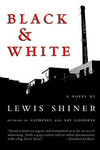Some brief notes on recent good reading, in the interest of catch-up.
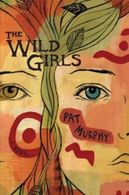 I admit to the slightest trepidation going into Pat Murphy’s new middle grade novel The Wild Girls after the little dust-up (which Colleen sums up best here, if you missed it); I was afraid it would disappoint. I need not have worried. Heartwarming isn’t usually a positive descriptor–coming from me, anyway–but this novel is the good kind of heartwarming. It’s about two girls becoming friends and the identities they take on in the forest–Sarah aka Fox, Queen of the Foxes, and Joan aka Newt–and the ones they forge in the larger world. Over a summer together in 1972 California, the girls grapple with their respective family troubles (Fox’s mother abandoned her and her science fiction writer father several years ago; Joan’s mother and father are seemingly en route to divorce) and discover their creative writing voices. Murphy effortlessly conjures the period, including the changing roles of women in the household during this period and the scene in Berkeley when the girls travel to their writing classes. While there’s no shortage of conflict, it’s perhaps a bit light in terms of how easily certain things are resolved, and the essential goodness of the two girls–but that’s okay. It’s refreshing, actually, to see so little angst, and the young voices struck me as true. Murphy manages to capture the dynamics of real famililial upheaval and its impact on kids, without ever leaning on cliches. While this is a solidly realistic novel, there are flourishes and sidenotes that may appeal to genre readers as well–I particularly enjoyed the type of writing that Fox and Newt do together, the fantasy stories they base on their real lives, and the reaction they get from the adults around them as a result. And there’s a beautiful recurring metaphor involving Fox’s vanished mother having turned into a fox. A gentle, delightful novel. See also: Colleen’s more detailed take here.
I admit to the slightest trepidation going into Pat Murphy’s new middle grade novel The Wild Girls after the little dust-up (which Colleen sums up best here, if you missed it); I was afraid it would disappoint. I need not have worried. Heartwarming isn’t usually a positive descriptor–coming from me, anyway–but this novel is the good kind of heartwarming. It’s about two girls becoming friends and the identities they take on in the forest–Sarah aka Fox, Queen of the Foxes, and Joan aka Newt–and the ones they forge in the larger world. Over a summer together in 1972 California, the girls grapple with their respective family troubles (Fox’s mother abandoned her and her science fiction writer father several years ago; Joan’s mother and father are seemingly en route to divorce) and discover their creative writing voices. Murphy effortlessly conjures the period, including the changing roles of women in the household during this period and the scene in Berkeley when the girls travel to their writing classes. While there’s no shortage of conflict, it’s perhaps a bit light in terms of how easily certain things are resolved, and the essential goodness of the two girls–but that’s okay. It’s refreshing, actually, to see so little angst, and the young voices struck me as true. Murphy manages to capture the dynamics of real famililial upheaval and its impact on kids, without ever leaning on cliches. While this is a solidly realistic novel, there are flourishes and sidenotes that may appeal to genre readers as well–I particularly enjoyed the type of writing that Fox and Newt do together, the fantasy stories they base on their real lives, and the reaction they get from the adults around them as a result. And there’s a beautiful recurring metaphor involving Fox’s vanished mother having turned into a fox. A gentle, delightful novel. See also: Colleen’s more detailed take here.
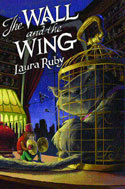 Laura Ruby’s The Wall and the Wing—could it be a standalone fantasy novel, that rarest of beasts? Well, it turns out no, there’s a sequel that came out last May (which sounds great, actually), but the key thing is that it can be read that way. This is a self-contained, quirky, charming story of a world where most people can fly (but not very well) and one girl, a forgotten orphan in a miserable orphanage (is there any other kind?), discovers she can turn invisible. There’s a heavy who can unzip his face, a boy with a mysterious past who can fly really well (sometimes), mobsters, and a mad professor with a bazillion cats. You get the picture. The world is extremely well-developed and I loved the sense of fun. Check it out if you like light but not shallow fantasy. See also: The SBBT featured some very good interviews with Ruby.
Laura Ruby’s The Wall and the Wing—could it be a standalone fantasy novel, that rarest of beasts? Well, it turns out no, there’s a sequel that came out last May (which sounds great, actually), but the key thing is that it can be read that way. This is a self-contained, quirky, charming story of a world where most people can fly (but not very well) and one girl, a forgotten orphan in a miserable orphanage (is there any other kind?), discovers she can turn invisible. There’s a heavy who can unzip his face, a boy with a mysterious past who can fly really well (sometimes), mobsters, and a mad professor with a bazillion cats. You get the picture. The world is extremely well-developed and I loved the sense of fun. Check it out if you like light but not shallow fantasy. See also: The SBBT featured some very good interviews with Ruby.
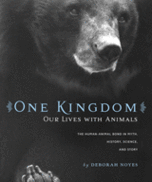 My favorite read of the month has to be Deborah Noyes’ One Kingdom: Our Lives With Animals: The Human-Animal Bond in Myth, History, Science and Story. It’s a mix of photos and creative nonfiction, the type of book that would be at home in that catch-all the sociology section but thankfully isn’t consigned to that purgatory. It’s for kids, but would definitely have cross-over adult appeal, and I’d even put it at the older age range for kids. The text is thoughtful and the prose finely tuned. The mix of myth with science and personal essay on the practically endless subject of the relationship between humans and animals is just right. This is really an example of my favorite type of nonfiction book, a sort of focused miscellany or catch-all meditation, and I hope she does another like it. See also: Cynthia Leitich Smith’s interview with Noyes.
My favorite read of the month has to be Deborah Noyes’ One Kingdom: Our Lives With Animals: The Human-Animal Bond in Myth, History, Science and Story. It’s a mix of photos and creative nonfiction, the type of book that would be at home in that catch-all the sociology section but thankfully isn’t consigned to that purgatory. It’s for kids, but would definitely have cross-over adult appeal, and I’d even put it at the older age range for kids. The text is thoughtful and the prose finely tuned. The mix of myth with science and personal essay on the practically endless subject of the relationship between humans and animals is just right. This is really an example of my favorite type of nonfiction book, a sort of focused miscellany or catch-all meditation, and I hope she does another like it. See also: Cynthia Leitich Smith’s interview with Noyes.
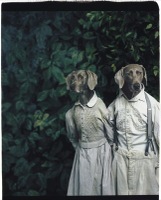 The New Yorker’s hosting online images of some of the striking art work that’s being exhibited at the Metropolitan Opera House’s gallery in honor of a new "Hansel and Gretel" production. I’m not a huge Wegman fan (or at all, actually), but this one is just creepy enough to drag me in.
The New Yorker’s hosting online images of some of the striking art work that’s being exhibited at the Metropolitan Opera House’s gallery in honor of a new "Hansel and Gretel" production. I’m not a huge Wegman fan (or at all, actually), but this one is just creepy enough to drag me in. 